- Home
- Helen Black
Twenty Twelve Page 19
Twenty Twelve Read online
Page 19
‘First the victim has to make a complaint,’ he says. ‘And from what you tell me, the prisoner has not done so. Without a complaint there is no victim, and without a victim there is nothing for me to investigate.’
‘That is ridiculous!’ the doc shouts.
The officer throws up his arms and lets them slap his thighs. ‘My hands are tied, miss.’
He leaves the hospital wing, a small smirk on his lips, and the doc smacks the side of her head with a fist. Then she takes a deep breath and makes her way over to Isaac’s bed.
‘I guess you heard all that?’ She fiddles with the chart attached to the metal frame.
Isaac nods.
‘I don’t suppose you’ll tell me who did this to you?’ she asks.
He doesn’t answer.
The doc sighs and sits on the bed. Even though she does it real gently, a pain shoots through Isaac almost as intense as his shame.
‘I know you’re scared,’ she says, ‘but if you would just give me a name I can help you.’
I look away. If I wanted to tell her, I couldn’t. There are just too many to recall.
Chapter Sixteen
The truck winds its way up the rugged terrain, endlessly twisting and turning. The hillside is little more than a green smudge on either side. The rain slows to an insistent drizzle and the clouds lighten.
As we reach the summit the truck slows and we pass the remains of another stone building, though the roof of this one has long since collapsed. The left wall is flanked by a small garden of gravestones, many having given up their fight against the elements and gravity. Only one stands proudly erect, seemingly impervious to time, its Celtic cross facing us in challenge. Ronnie makes a sign of the cross. An unthinking gesture. I’m about to say she doesn’t strike me as the religious type when she holds up a hand to stop me as Tiny cuts the engine. She points across the graveyard.
‘What?’ I ask.
‘Hush.’ She puts a finger to her lips and continues pointing.
I follow the line down her arm and into the trees. At first all I can make out are boulders and moss and tangles of gorse. Then I see it. A hare. He stands tall, sniffing the air, his head and ears proud.
The driver’s door opens slowly and Tiny eases himself out, a rifle in his right hand. Soundlessly, he steps forward and brings the gun to his shoulder, looking down the sights.
Horrified, I realise he’s about to kill the defenceless creature and I stand and cup my hands around my mouth. ‘Go on,’ I shout.
The hare starts at the sound. Then the ring of Tiny’s bullet echoes through the sky. The hare falls backwards, his legs cycling in the air, a high-pitched squeal coming from his mouth. Tiny runs to him, takes aim above his head and fires. The hare’s legs thud to the ground.
‘What the hell do you think you were doing, Jo?’ Ronnie hisses.
‘It’s not right,’ is all I can manage.
Ronnie shoots me a look of disgust. ‘Do you eat meat?’
‘Yes,’ I murmur.
‘Then don’t be a fucking hypocrite,’ she says. ‘All you did was make sure the animal suffered when he didn’t need to.’
She jumps over the side of the truck and makes her way to Tiny, her boots swishing in the wet grass.
Tiny bends forward with a grunt, picks up the dead animal and throws it into the back of the truck where it lands inches from my feet. The bullet wound to the head is small and clean, a neat hole between the eyes. The wound to the flank, however, is ragged, the hare’s fur ripped open and spewing blood.
‘Lucky for you he didn’t get away, city girl,’ says Tiny, a raindrop shivering under his nose. ‘Otherwise I’d have had to shoot you.’ He lets out a hoarse shout of laughter that releases the drop of water. I watch it fall onto the hare’s back with a gentle plop.
‘All right then.’ Tiny nods in approval, wipes a slick of blood from his hands down his jeans and gets back in the cab.
‘Don’t do anything else stupid,’ Ronnie warns me.
Carole-Ann had followed the trail of the man who gave Tommy the rucksack to a ground-floor flat in Leyton.
Clem was parked on the street outside, waiting for backup, when he spotted a man in his rearview mirror. No hat or dark glasses, but something in his manner was familiar.
He punched at his speed dial.
‘Are you there?’ asked Carole-Ann.
‘Yeah, and I think our man has just arrived.’
Clem watched him turn off the street at the gate and pat his pocket for keys.
‘The flat is registered to a Paul Ronald,’ said Carole-Ann. ‘I’ve spoken to the landlord and he described his tenant as mid-twenties, slim build, sandy brown hair.’
The description fitted. ‘It’s him,’ said Clem. ‘And for a man who died on Christmas Day, he’s looking remarkably perky.’
Clem got out of the car and arrived at the gate as the man put his key in the lock.
‘Paul Ronald,’ he called out.
The man turned to the sound of Clem’s voice.
‘I need a word,’ said Clem.
The man hesitated for a second, assessing the situation, then opened his front door and dived inside. Clem leapt forward and, as the man tried to slam the door behind him, got a hand to it and prevented the deadlock catching.
‘Armed police!’ he shouted, but knew it was meaningless. The man had already worked it out.
Clem took out his gun and stepped inside. The hallway was a mess of trainers, bags and recycling boxes overflowing with glass bottles and jars. Carefully, Clem stepped over the detritus, weapon held out in front of him.
He knew he should wait for backup and the bomb squad. He remembered the guys blown to smithereens by booby traps. Christ, this was like bloody Groundhog Day.
He stood very still and listened. There was a scrabbling sound through the partition wall. There was no direct access from the hall. In order to get to it, Clem would have to go through another room, presumably the living room.
He nudged the door with his foot. He was right about the layout, but the term living room was a complete misnomer. Everything in here spelled death. A battered sofa was covered in tins of peroxide and measuring jugs. Wires were scattered across the floor, tangled up with pliers, screwdrivers and rolls of gaffer tape. The glass coffee table tucked in the corner was littered with nails, screws and razor blades. Clem thought of poor Tommy Frasier carrying his payload and checked his revulsion.
The noise came again, from behind a closed door on the far side. Clem cocked his finger around the trigger of his weapon and crept towards it. Then he opened it with his foot and stepped inside.
As Clem had suspected, it was the kitchen and the man was standing on the draining board, his back to the door, struggling with the locks on the window, clearly about to attempt his escape.
‘Put your hands on your head,’ Clem instructed.
The man froze.
‘I’m armed,’ said Clem. ‘Put your hands on your head and turn around slowly.’
The man did as he was told and gulped at the sight of Clem’s gun trained on him.
‘Get down from there,’ said Clem. ‘Slowly. Very slowly.’
The man crouched on the draining board, washing-up water pooling around his trainers, then made a small jump onto the floor, the rubber of his Nikes making a soft squelch.
‘Stay exactly where you are,’ ordered Clem and he made his way around the man, reaching into his pocket for hand restraints.
‘Leave your right hand on your head and put your left behind your back,’ said Clem. The man obeyed and Clem secured the plastic restraint around his wrist.
In a moment, Clem would have the man under control. It would be tempting to beat him to a pulp when he was helpless. After all, he had taken advantage of Tommy’s vulnerability. But Clem wouldn’t do that. Instead he would take him back for interrogation and make him squeal.
‘Now bring your right hand down slowly,’ Clem instructed.
As if in slow moti
on, the man let his arm fall by his side. Clem reached for the hand, ready to bind it to its mate.
Without warning, the man snatched it away and dived towards a drawer.
‘Don’t move,’ Clem shouted, but the man’s hand was already inside. Then he spun back to face Clem, brandishing a kitchen knife. A ray of sunlight coming through the window made the steel sparkle.
‘Don’t be stupid,’ said Clem.
The man’s forehead was covered in a sheen of sweat and his hand shook.
‘That is no match for this gun,’ said Clem. ‘So why don’t you just put it down?’
The man shivered.
‘I don’t want to have to shoot you, but I will.’
The man’s shoulders slumped as if he knew the game was up. In the time it would take for him to strike at Clem, a bullet would be twice as quick, and at this range the damage inflicted would be fatal.
‘Throw it in the corner,’ Clem indicated with a jerk of his head.
The man looked defeated and let his hand fall; then he stood, head flopped onto his chest, knife held loosely in his palm. ‘It wasn’t supposed to be like this,’ he said.
‘It never is, son,’ Clem replied.
The man looked up at Clem, eyes glassy with tears. ‘I’m sorry,’ he said as he plunged the blade into his neck then dragged it across his throat.
The summit crossed, we make our way down the other side, the truck at a sickening angle as Tiny snakes in and out of rocks, barely slowing to avoid collision.
When we arrive at a stream flowing across our path, he ploughs on through, water splashing up from the tyres, splattering Ronnie and I. The droplets are freezing on my skin and I wipe them away with the back of my sleeve, my teeth chattering.
‘Just be glad it’s summer,’ says Ronnie. ‘It’s stupidly cold up here in winter.’
I almost laugh. ‘How far?’ I ask, hoping we don’t have to make our way to the bottom.
‘Not all the way,’ Ronnie chuckles.
In fact it’s only ten minutes or so when the clouds break and a weak shaft of sunlight finds its way to us as we rumble into a clearing with four crofter’s cottages clustered together in a small valley.
A German Shepherd leaps from a doorway and bounds towards us, barking, teeth bared. As we come to a stop, the dog leaps up, paws on the side of the truck, fangs sharp and snapping inches from me.
‘Down, Hero,’ Tiny shouts. ‘Down!’
The dog takes his paws from the truck, but his eyes don’t move from me as he emits a growl from somewhere deep in his throat, his tail down, ready to attack.
‘Bloody dog,’ Tiny says and I notice he hasn’t left the cab.
A man comes out of the furthest cottage and lets out a whistle. Hero turns and runs back to him and I feel Ronnie tense besides me.
The man pats the dog, orders it to stay and walks slowly towards us. Ronnie stands and shields her eyes with the palm of her hand. When he’s ten feet away, the man stops and stares.
He’s wearing faded jeans and work boots and his shirt hangs open despite the sharpness of the wind. His torso is completely hairless but covered in tattoos and scars. Even his neck and the left side of his face are inked with a constellation of blue stars. He rubs distractedly at a pierced nipple. It’s impossible to tell what he’s thinking because he’s wearing a pair of mirrored shades. Like those ones you see in telly programmes from the seventies. He has a rifle in his right hand.
‘Hi, Ronnie,’ he says at last. His accent is American, the slow intonation of the Deep South.
‘Hello,’ she replies.
‘Is that who I think it is?’ He waves the rifle in my direction.
‘Uh huh,’ says Ronnie.
The man pauses for a second, then spits in the dirt at his feet. ‘You shouldn’t have brought her here.’
‘I needed an insurance policy,’ she says.
He shakes his head then spits again, leaving a trail of saliva dangling from his chin. He wipes it away with his forearm.
‘Come on now,’ Ronnie calls to him. ‘I brought you a present.’ She points down at the hare lying on the floor of the truck. The blood from its wounds has started to congeal and flies buzz around its nose, mouth and arse.
The man wanders over and peers inside, then looks up at Ronnie. She smiles at him, her eyes glittering. ‘Go on then,’ he says. ‘I expect you and your friend need to clean up and get a drink.’ Then he turns and walks back to the cottage.
‘It’s good to see you,’ Ronnie shouts.
The man stops in his tracks and his head droops before he half turns to her. ‘And you,’ he says, then disappears inside, slamming the door behind him.
Tiny leads us past the cottages to the far side of the clearing and the foot of the next hill.
‘Over yonder,’ he points to the top, ‘you’ll find a cabin. Should be a free room in there.’
Then he lopes back to the truck and lights a cigarette.
We make our way up until we can peer down into the next valley and find a log cabin nestling in the shadows.
‘Home sweet home,’ says Ronnie and trudges down towards it.
The porch is littered with empty bottles and Ronnie kicks her way through into the dark interior. The smell inside reminds me of changing rooms at school. The unmistakable stink of sweat, unwashed clothes and shoes. It’s exacerbated by the gloom, which seems to lock the odour in. There are windows, but the glass is filthy and outside the green slopes hem us in. The walls and ceilings are made of thick dark wood, which acts like a cocoon.
I hear a match strike and watch Ronnie’s face illuminated in its flame, before she lights a collection of candles on a rough wood table. She takes one, melting it onto its saucer holder and wanders through to the next room. There, there are two bunk beds, filthy blankets rumpled on each, and an overflowing ashtray spills out onto a low bedside table. Nailed to the wall is a flag. It’s a tricolour of red, blue and white with a red star placed in the centre.
Ronnie leaves the room, shutting the door behind her, and goes next door. This room is smaller, with only enough space for one bunk bed. It seems empty.
‘Looks like we’re home,’ says Ronnie and throws her leather jacket and cap onto the top bunk. With her back to me, I once again catch sight of the scar on her shoulder.
When she turns, I busy myself taking off my trainers. I can feel the crunch of dirt on the soles of my feet but I don’t care. I wiggle my toes, grateful for the freedom.
‘I was shot,’ she says.
I don’t look at her, but I nod. I thought that must be the case.
‘By the police,’ she adds and wanders out of the bedroom.
I follow her back into the first room, where the candles are now dancing on the table. Ronnie is rummaging in a fridge in the corner of the room. She pulls out two bottles of water and hands one to me.
‘The guy with the dog,’ I say. ‘Is that Hawk?’
‘Yep.’
‘And he’s the one who’s going to help you?’
Ronnie nods.
‘He didn’t look very keen.’
She shrugs.
‘Are you sure he’ll do what you want?’ I ask.
‘I told you.’ Ronnie takes a drink. ‘He owes me.’
‘What did he do?’ I ask. ‘Or more to the point, what did you do?’
‘Let’s wash up,’ she says and makes her way outside to a water butt by the side of the cabin. She takes off the lid and squints inside.
‘No spiders in there, are there?’ I joke.
‘Gotta make sure,’ she says.
I cringe and peek inside. ‘Looks okay.’ I go to reach in.
Ronnie bats my hand away. ‘Don’t put your filthy paws in clean water.’
She reaches around the back of the butt and finds a ladle attached by a chain. She dips it in the water, scoops some up then pours it over one hand before switching sides. Then she takes another scoop and pours it down her back with a shiver.
She hands me the lad
le and I follow suit, first washing each hand carefully, then splashing some on my feet. Finally I pour a couple of scoops over my head, rolling my neck in ecstasy.
I’m interrupted by voices coming from the other side of the hill and the sound of boots crashing through the grass. Three men appear at the summit, each wearing a camouflaged combat jacket and carrying a gun. They stop dead when they see us.
‘Hawk put us in the spare room,’ Ronnie calls out to them.
They mutter to one another in a language I don’t understand.
‘Serbs,’ Ronnie whispers.
They make their way to us, stopping feet from the porch. ‘Where you come from?’ asks one.
‘England,’ says Ronnie. ‘London.’
They speak excitedly among themselves, nodding and laughing. ‘What’s happening there is good, yes?’ says the man. ‘The bombing has been effective, yes?’
I open my mouth to tell him that, actually, it’s been a fucking tragedy, but Ronnie elbows me. Hard.
‘It’s been very effective,’ she says.
They move inside the cabin and the two that clearly can’t speak English smile at me and give me the thumbs up. I return the gesture, feeling sick to my core.
When they’re out of sight Ronnie puts up her hand to me. ‘Don’t say it. I want to get out of here and you want to go home, right?’
I nod.
‘Then don’t cause any more problems, Jo. Please.’
Dear Veronica-Mae,
This is the fourth time I’ve written and I still don’t know if my letters are getting to you.
Sometimes I think maybe you get them, but you’re too busy with your new life to reply.
Bert says you been placed with a new family and I wonder if you want to put me and everything else behind you.
I hope that’s not so, cus right now I need every friend I got. The only person here who was prepared to give me the time of day was the doc on the hospital wing. And she got herself transferred someplace else without even saying goodbye.
At night when I close my eyes and try to say my prayers, nothing comes. I concentrate real hard but all I can hear are the sounds of the jail around me. I don’t know what Mama would have to say, but it seems like even God has abandoned me. I can see how that sounds like blasphemy but bad things happen here all the time and He ain’t given me no protection.

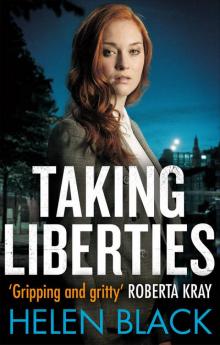 Taking Liberties (Liberty Chapman)
Taking Liberties (Liberty Chapman)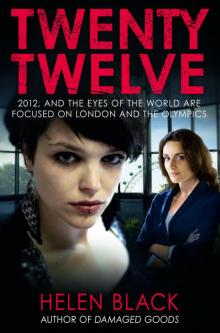 Twenty Twelve
Twenty Twelve Dishonour
Dishonour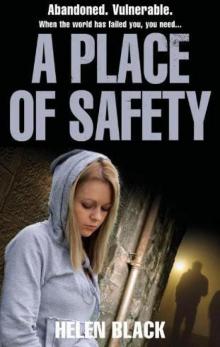 A Place Of Safety
A Place Of Safety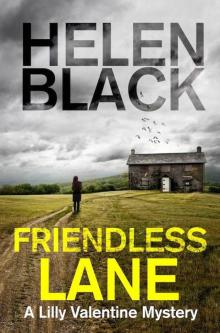 Friendless Lane
Friendless Lane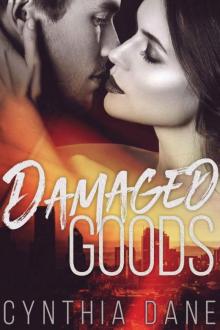 Damaged Goods
Damaged Goods